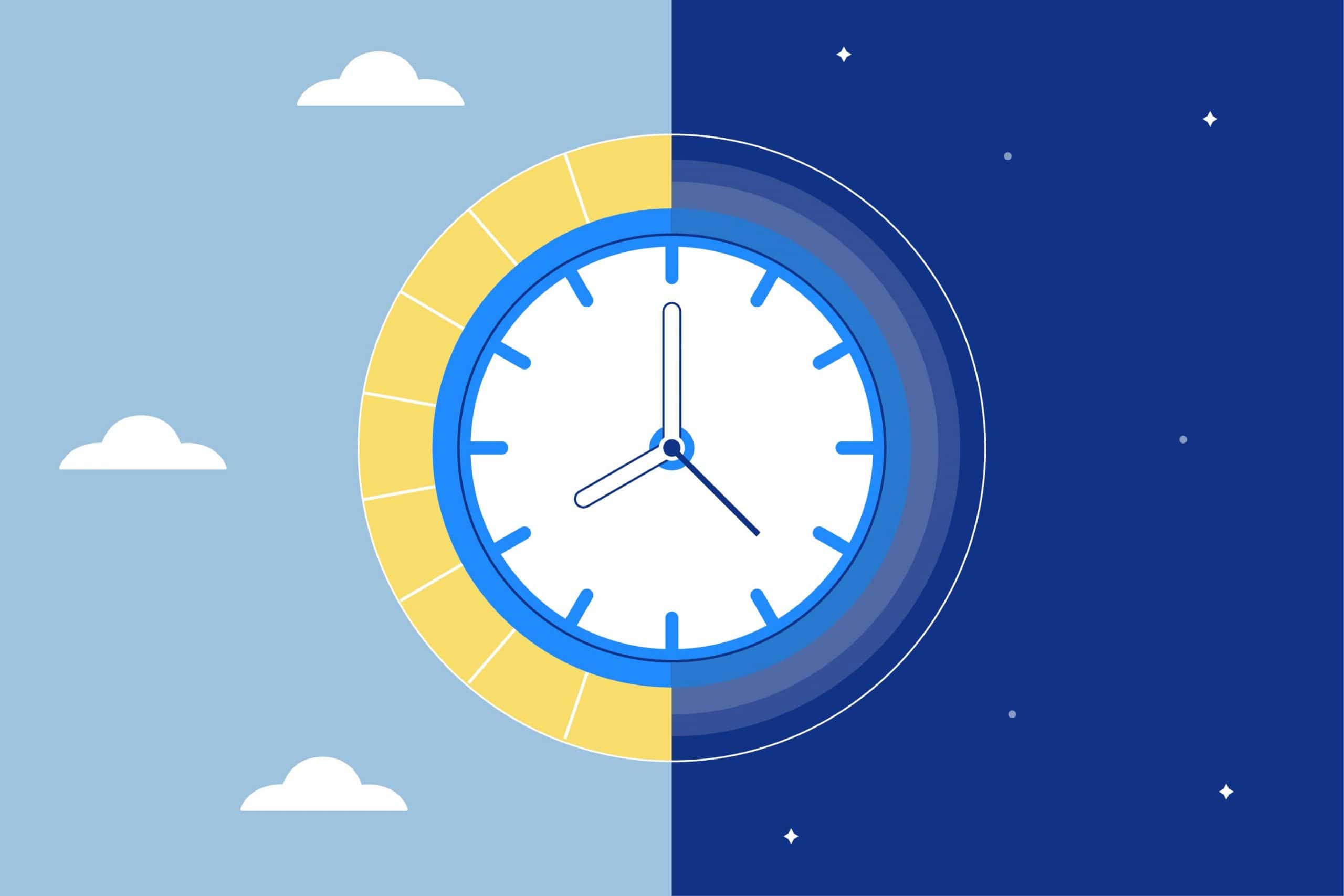Key Takeaways
- Need for Sleep Consistency: Consistency in your sleep schedule is crucial for maintaining a healthy sleep pattern. Your body operates on a biological schedule known as the circadian clock, which regulates when you feel tired and awake. Deviations from this schedule, such as shift work or travel, can disrupt your sleep routine.
- How to Improve Sleep Schedule: Strategies to reset your sleep clock and improve your sleep patterns include manipulating lighting, normalizing meal times, spending time outdoors, pulling an all-nighter (under medical supervision), and taking gradual steps to adjust your sleep schedule.
- Importance of Good Sleep Hygiene: Maintaining good sleep hygiene is essential for healthy sleep patterns. This includes sticking to a consistent sleep schedule, creating a relaxing bedtime routine, limiting caffeine intake in the afternoon, avoiding electronic devices before bedtime, and keeping your bedroom conducive to sleep.
A normal sleep routine can be disrupted by shift work, traveling, or even just a busier-than-normal schedule. While you can try napping to “catch up” on sleep, recent research Verified Source Wiley Multinational publishing company specializing in academic and instructional materials. View source has found that napping to make up for lost sleep isn’t the most effective, and your body prefers to follow a consistent sleep pattern, instead. Instead of battling with sleepless nights and groggy days, try these five techniques to reset your internal clock and get better sleep.
Each of us operates on a biological schedule that plays a big role in when we feel tired and when we feel awake. When our internal sleep clock, more properly known as the circadian clock, is functioning normally, it sends our bodies signals to sleep in the evening and wake up in the morning.
However, sometimes this sleep clock can fall out of sync, throwing your regular schedule out of whack. This clock is still just one part of the sleep-wake cycle, though.
“There is also a homeostatic process,” says Dr. Stuart Peirson. “Which refers to the familiar concept that the longer we are awake, the more we need to sleep (sometimes referred to as sleep pressure). When we sleep is therefore dependent upon an interaction between these two processes.”
Still, throwing your inner clock out of order can affect your overall sleep quality while also making it difficult to fall asleep quickly and wake up at the right times, ultimately leaving you sleep-deprived or with “social jetlag” that can affect performance and moods.
“Social jetlag specifically refers to the fact that our normal working routine is misaligned with our circadian clock,” explains Dr. Peirson. “The usual consequence of this is that during the working week, we become sleep deprived and need to sleep more on free days (such as the weekend) to catch up on the sleep we have lost.”
If you find yourself with a broken sleep clock, there are a few strategies you can use to get back on track. Read on to learn about your sleep clock and how to reset it for better rest.
Understanding How Your Sleep Clock Works
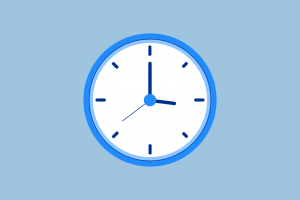 Before we get into fixing the problem, it can be helpful to know what your sleep clock is, what it does, and how it works so that these strategies make sense.
Before we get into fixing the problem, it can be helpful to know what your sleep clock is, what it does, and how it works so that these strategies make sense.
The term “sleep clock” — also known as the circadian clock — refers to several biological mechanisms that control the cycle of wakefulness and tiredness, led by the suprachiasmatic nuclei (SCN) in the hypothalamus.
This cycle is also known as the circadian rhythm. When functioning optimally, this rhythm means you will get sleepy in the evening around the same time, and wake in the morning at about the same time each day.
“This is why we struggle to sleep when we shift our clock – for example by switching time zones or working shifts,” notes Dr. Peirson.
As far as timing goes, normal biological variation exists, with some people naturally predisposed to earlier sleep-wake times and others to later sleep-wake times. To an extent, genetics influence sleep habits but behaviors and the environment also play a role.
Science doesn’t understand everything yet, but essentially the body's internal clock Verified Source National Library of Medicine (NIH) World’s largest medical library, making biomedical data and information more accessible. View source is influenced by a combination of external cues, with light as the primary cue and temperature as a weaker time cue for the circadian system. These external cues work with internal cues (like hormones, neurotransmitters, and genes) and behaviors (like delaying sleep or activity levels).
Resetting Your Sleep Clock and Improving Your Rest
Based on the knowledge of our sleep-wake cycle and how the body’s circadian clock works, there are a few ways to adjust sleep schedules and fix patterns.
1. Manipulate Lighting
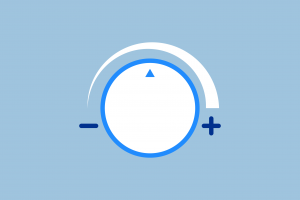 Research suggests that manipulating light exposure may help reset the body clock, particularly for disturbances caused by jet lag. Light remains a key focus of researchers, and is often a point of treatment for sleep phase disorders.
Research suggests that manipulating light exposure may help reset the body clock, particularly for disturbances caused by jet lag. Light remains a key focus of researchers, and is often a point of treatment for sleep phase disorders.
The daily cycles of lightness and darkness are a key “zeitgeber” or cue that acts on the mechanisms of your sleep clock and circadian rhythm. A specialised subset of retinal ganglion cells in your eyes detect light cycles and transmit information to your SCN. Overall, retinal ganglion cells are the neurons in your retina that project to the brain.
“Most of these receive light information from our visual photoreceptors and are involved in seeing the world around us,” says Dr. Peirson. “Only 1-3% of these RGCs express the blue-light sensitive protein melanopsin and transmit light information to the SCN. However, these intrinsically photosensitive retinal ganglion cells (ipRGCs) are the conduit for all light information to the circadian clock.”
In the presence of light, the SCN prompts the pineal gland to produce melatonin, the body’s signal for nighttime sleep. It is a common misunderstanding that melatonin makes us drowsy and ready for sleep, notes Dr. Peirson.
“Melatonin is produced when it is dark, and when it is dark, we sleep,” he says. “However, over 30 years of research has shown that melatonin does not cause sleep. And taking melatonin has little effect on helping us fall asleep. Indeed, nocturnal species produce melatonin on a night when they are awake. Furthermore, studies on subjects who had to have their pineal removed for medical reasons (usually tumours) show that their sleep before and afterwards is unchanged.”
It’s more important to focus on developing a good sleep routine than relying on melatonin supplements. Essentially, this means you should follow earth’s natural cues. Expose yourself to natural sunlight and bright light in the morning and throughout the day. Start dimming lights in the evening as the sun winds down, with your bedroom being virtually black and devoid of any screens.
Of course, you’ll want to limit screen time and strategically minimize light exposure while resetting your sleep schedule. Intense, bright light can trick your body into thinking its daytime when it’s really dark outside.
Devices such as laptops, televisions, and cell phones all emit blue-enriched light, corresponding to the peak sensitivity of the circadian clock. The longer you expose yourself to this light in the evening, the longer melatonin production is delayed. To prevent hindering your own night’s sleep, utilize the Night Mode feature on your devices or avoid them altogether.
“Reducing blue light is one way of helping here, as the light will appear dimmer,” notes Dr. Peirson. “Even if you cut out all blue light, if you are exposed to brighter light of other colors, this will still delay your circadian clock.”
2. Fast, Then Normalize Meal Times
 Digestion and metabolism also play a role in wakefulness and sleepiness. When you eat, and to some extent, what you eat, can help you reset your sleep clock.
Digestion and metabolism also play a role in wakefulness and sleepiness. When you eat, and to some extent, what you eat, can help you reset your sleep clock.
Harvard researchers found that, in animals, circadian rhythms shifted to match food availability. Researchers suggest that fasting for about 16 hours (for example during flight and until the next local meal time) could help reset sleep clocks for humans and reduce jetlag when traveling across time zones.
“Food can affect entrainment, and reducing late eating can help prevent your clock being delayed,” notes Dr. Peirson. “But only if you are consistent with both light exposure and meal timing.”
For non-jetlag sleep clock disturbances, you could try a 16-hour fast as well. Eat an early dinner (around say 4 p.m.), and then avoid food until breakfast time (8 a.m.) the following morning.
Once your sleep is back on track, stick to regular breakfast and dinner times to help support consistent circadian rhythms, with about 12 hours between breakfast and dinner. Eat dinner at least a few hours before bed, and a filling breakfast shortly after waking.
See our list of nutrient-rich recommended foods for some dinner ideas.
3. Go Camping
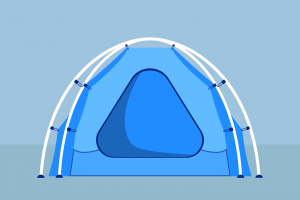 Since natural light schedules help aid the body’s circadian rhythm, it makes sense that spending plenty of time outdoors could help restore natural cycles. For your next vacation, consider taking to the tents to reset your sleep clock and sleep well while camping.
Since natural light schedules help aid the body’s circadian rhythm, it makes sense that spending plenty of time outdoors could help restore natural cycles. For your next vacation, consider taking to the tents to reset your sleep clock and sleep well while camping.
Research published in the Current Biology journal put this hypothesis to the test, with eight participants spending one week camping without electrical lighting, smartphones or laptops.
They found this natural pattern helped synchronize biological clocks to solar time, with people sleeping earlier and waking earlier than in their normal routines. The biggest changes were seen in evening types, or “night owls.”
“A key conclusion here is that our modern artificial light exposure leads to our circadian clocks being delayed, shifting our sleep to a later phase (along with our melatonin rhythms – used as a marker of the circadian clock),” says Dr. Peirson. “The primary differences between artificial light and natural light/dark cycles are 1) Natural light is brighter during the day and 2) Artificial light leads to exposure to light on an evening.”
“The evening light exposure will delay the phase of our circadian clock. However, it is thought that brighter light during the day will strengthen our circadian rhythms and make them less susceptible to becoming misaligned.”
4. Pull An All-Nighter (or All Day-er)
 One approach to improve your sleep schedule is to stay up one full day until the next normal bed time. This method is essentially planned sleep deprivation, so it is best done under doctor supervision.
One approach to improve your sleep schedule is to stay up one full day until the next normal bed time. This method is essentially planned sleep deprivation, so it is best done under doctor supervision.
There is not a lot of specific research on this method outside of anecdotal accounts for overcoming sleep clock problems, but it is a clinical part of chronotherapy and has been researched for depression treatment.
“Sleep deprivation targets the homeostatic process – not the circadian clock,” notes Dr. Peirson. “We sleep better the next day because when we stay awake all night, our sleep pressure is much higher the next day. This means we will find it easier to sleep, even if our clock is not as well-aligned (or our circadian clock is weaker).”
If you have been going to bed at 4 a.m. and waking at noon, you would wake at your normal time (perhaps on a Friday) then not sleep again until perhaps 10 p.m. the next day (Saturday). Light and mild activity could be helpful for staying awake.
Pulling an all-nighter is hard on the body, and you may feel the effects for a few days after. Be aware that you should expect to be tired, and that you should never drive or perform any other dangerous tasks when sleep deprived.
5. Take Gradual Steps
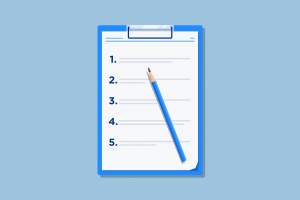 For many people, slow and gradual changes are best when it comes to achieving long-term results. Small changes can also be easier on you physically and mentally, especially if you don’t have days to recover from sleep deficits.
For many people, slow and gradual changes are best when it comes to achieving long-term results. Small changes can also be easier on you physically and mentally, especially if you don’t have days to recover from sleep deficits.
Adjust your schedule by no more than 30 minutes per day, and remain at each phase until your body catches up to the changes. Once you are sleeping and waking at ideal times, don’t forget to maintain a consistent schedule every day of the week.
For example, if your sleep clock is running late by two hours and you’re sleeping in late, here’s a potential plan for getting back on track painlessly within one month. Each week, set your bedtime and wake time 15 minutes earlier on Sunday nights, then again on Wednesdays. After four weeks, you should be on back on track.
For large delays, it may actually be more helpful to push bedtimes forward by one to two hours until you reach a normal bedtime. If your sleep clock is delayed by several hours and gradual steps aren’t cutting it, a doctor or therapist may be able to plan a more regimented chronotherapy approach for your situation.
Practice Healthy Sleep
Don’t forget to follow essential sleep hygiene principles during, and after, your sleep clock reset.
- Stick with your plan.
- Go to bed early enough to ensure you’re getting the recommended hours of sleep (the CDC says adults need 7 to 9).
- Maintain a strict and consistent sleep schedule—go to sleep and wake up in the morning at the same time every day (even on weekends).
- Don’t take naps longer than 20-30 minutes.
- Limit caffeine after lunch.
- Create a relaxing bedtime routine.
- Avoid electronics that can affect sleep, along with bright lights and stress in the hours before bed.
- Keep your bedroom quiet, dark and cool.
- Don’t stress about not sleeping—think in positive terms.
If improving sleep hygiene doesn’t help or your sleep schedule is impacting your daily life, you may also want to reach out to your doctor or sleep specialists. They would be able to help you set up a plan, suggest supplements, and diagnose any sleep disorders or underlying conditions to help you fix your sleep cycles.
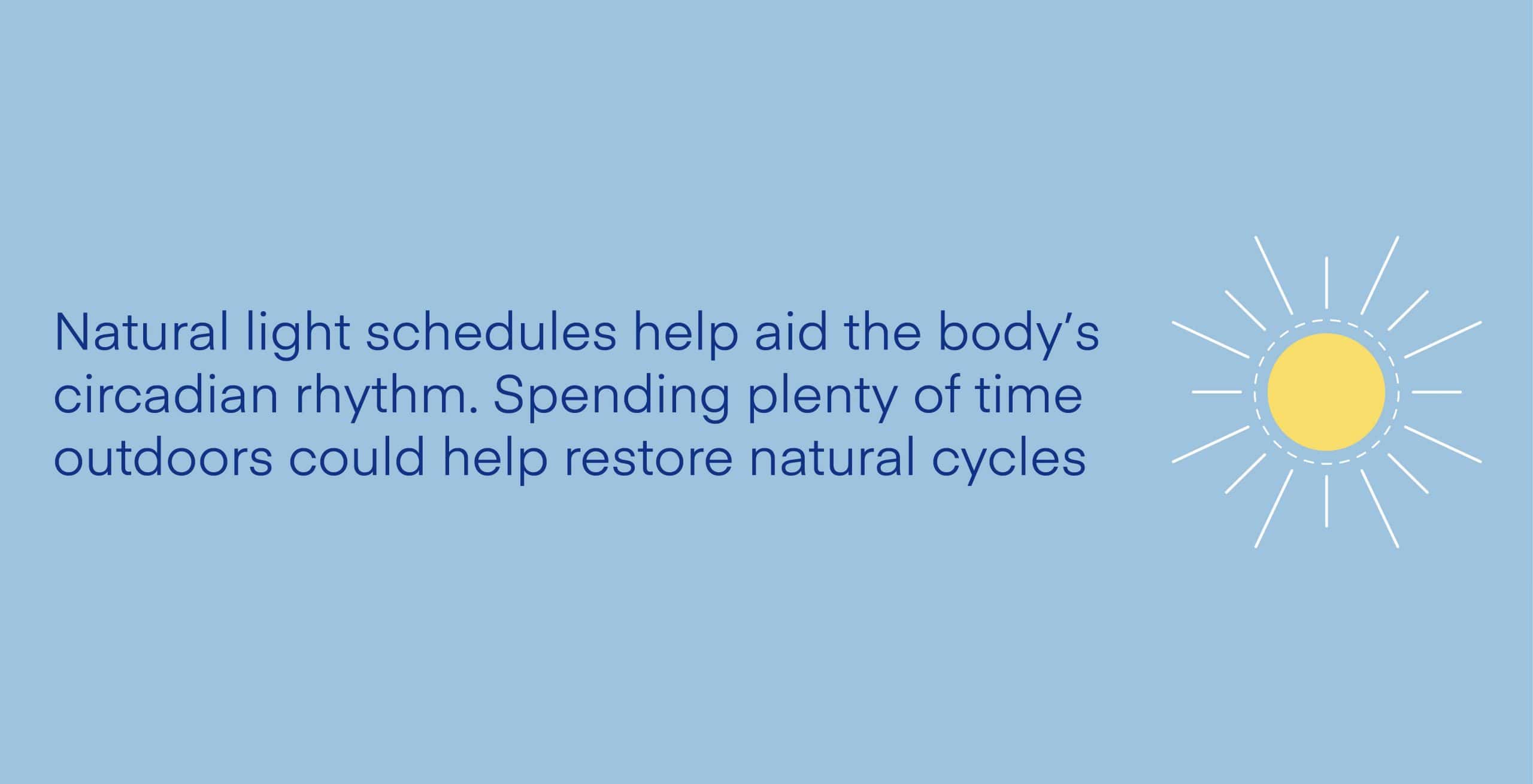
Frequently Asked Questions
Which age group requires the most sleep?
Newborn infants up to three months old require more sleep than any other age group, requiring 14 to 17 hours of sleep in a day. Older infants need slightly less sleep, and toddlers need less still. This sleep need in us gradually lessens as we grow up, with adults needing an average of 7 to 9 hours a night.
Should I get up if I can’t sleep?
If you find you find you’ve been lying in bed for 20 to 30 minutes without falling asleep, then it can be helpful to get out of bed and try something else. Try to keep the lights low as you make yourself a cup of tea for sleep or read a few pages of your book. Return to bed when you find yourself nodding off.
How do I set a good sleep schedule?
Consistency is the key to maintaining a good sleep schedule. Try to wake up at the same time every day, even on your days off when it can be tempting to sleep in, as this will make it easier to drift off at night. You also want to focus on relaxing activities before bed, instead of stimulating ones.
What is an unhealthy sleep schedule?
Taking too long to fall asleep every night is one sign that you need to re-calibrate your sleep schedule. If you spend more than 30 minutes trying to fall asleep after getting into bed, that’s longer than the average needed to fall asleep. Getting less than 7 hours of sleep is another sign that you need to polish up your sleep hygiene, as too little sleep can reduce your physical and mental performance.
What should I not do before bed?
One big no-no before bedtime is using a device that emits blue light. Try to turn off your computer, tablet, and cell phone an hour before bed, as the blue light from these devices can stimulate your brain too much, causing wakefulness.
You also want to try to avoid overeating close to bedtime, especially when it comes to spicy, fatty, and sugary foods. Eating too close to bed time can cause stomach upset and heartburn when you go to lie down.
Are You on the Right Mattress for Your Needs?
Everything we mentioned above assumes you aren’t sleeping on a bed that is so uncomfortable you spend all night tossing and turning.
It may surprise you to know we can actually pinpoint the best mattress for you based on your factors such as sleeping position, weight, body shape, and more.
For example, side sleepers tend to prefer softer mattresses. The plushness of a soft mattress helps alleviate common pressure points on their shoulders and hips.
Finding the right mattress for you will help you practice better sleep habits and, once your clock is reset, keep up a consistent sleep schedule.
Have you ever had to reset your sleep clock before? What tricks worked for you when trying to reset your sleep clock?
About the author
Rosie Osmun, a Certified Sleep Science Coach, brings a wealth of knowledge and expertise to the health and wellness industry. With a degree in Political Science and Government from Arizona State University College of Liberal Arts and Sciences, Rosie's academic achievements provide a solid foundation for her work in sleep and wellness. With over 13 years of experience in the beauty, health, sleep, and wellness industries, Rosie has developed a comprehensive understanding of the science of sleep and its influence on overall health and wellbeing. Her commitment to enhancing sleep quality is reflected in her practical, evidence-based advice and tips. As a regular contributor to the Amerisleep blog, Rosie specializes in reducing back pain while sleeping, optimizing dinners for better sleep, and improving productivity in the mornings. Her articles showcase her fascination with the science of sleep and her dedication to researching and writing about beds. Rosie's contributions to a variety of publications, including Forbes, Bustle, and Healthline, as well as her regular contributions to the Amerisleep blog, underscore her authority in her field. These platforms, recognizing her expertise, rely on her to provide accurate and pertinent information to their readers. Additionally, Rosie's work has been featured in reputable publications like Byrdie, Lifehacker, Men's Journal, EatingWell, and Medical Daily, further solidifying her expertise in the field.
View all posts